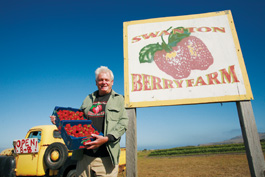home | metro santa cruz index | santa cruz county restaurants | review

Photograph by Carlie Statsky
JUICY JUSTICE : Jim Cochran treats the planet and his workers with respect, all while managing to grow delicious produce.
Profile: Jim Cochran
This longtime Santa Cruz farmer knows how to manage his finances, but he also knows how to be a good boss and environmental steward
By Christina Waters
The old gray barns clustered at the edge of Highway 1 are filled with weathered pallets and decommissioned tractors. The ocean waits outside the front door, where visitors load up with berry pies and coffee. A U-Pick strawberry patch is a five- minute walk from the parking lot, five of the most scenic minutes anywhere in California. Swanton Berry Farm is 25 years old and a tribute to Jim Cochran's willingness to gamble.
"It never occurred to me to become a farmer," admits Cochran, a tall, striking man whose hair has been white for as long as anyone can remember. After a liberal arts education at UCSC, he stayed on in the area, "because in those days we could get relatively inexpensive land." After working with Manny Santana's Central Coast Counties Development Corporation helping organize farmworkers for management roles, Cochran decided to jump in for himself. "I really got the farming bug," he confides.
The first in the country to be certified organic, Cochran's berry farm is now also the first organic farm with an AFL-CIO contract guaranteeing worker wages and benefits. Such a commitment is possible in part because Cochran doesn't own his own land. "It's too damn expensive," he explains.
His early farm organizing days taught him about the dangers of debt. "Small farms borrowed too much money," he says, "and got into trouble." Of the 200 acres he leases, Cochran has roughly 70 acres in production at any time. "There are limitations on how much we can cultivate--water is one factor," he explains. Organic farming methods require land-intensive crop rotation, and cover crop planting as well. "Plus there's a limit to how much we can handle--to what we can do well." Currently Cochran plants 20 acres in strawberries, with the rest distributed among olallieberries, blackberries, artichokes, broccoli, kiwis and peas.
In the beginning, Cochran recalls, it cost more to grow organic strawberries than the customer paid for them. "At that point we had to work with produce managers on how to present and explain organic. Once we did that, then the public came along." Cochran credits grocery produce managers with much of his success. And being in Santa Cruz didn't hurt.
"We do 10 farmers markets a week, from Marin down to Aptos," says the grower. "We sell a lot of product at the farmers markets--our ability to pay higher benefits depends on those markets," he insists. "And on not owning the land." The downside of that is that the land could simply disappear. "You have to be able to live with a certain amount of insecurity. Every year there are probably one or two or three very serious threats to the farm. And I start to panic. Are we going to lose our lease? Or will there be enough water? Then you have to say to yourself--there are always gonna be worst-case scenarios." Taking huge risks suits Cochran just fine. "I do like pushing it," he smiles.
Cochran believes his role has been to demonstrate what was possible, not just talk the talk. "And yes, there has been some success. Organic is finally happening, and the labor situation is changing. It has to."
Today Cochran delegates day-to-day farming operations to focus on strategic and long-range planning. The farm is now in the fourth year of an employee stock ownership plan. "We make a contribution to that plan, which can end up amounting to a good pension once workers have been here a while. Part of my goal is to bring innovation into farming." As a member of the progressive farming network, Roots of Change [RocFund.org]," Cochran's goal is "to transform the California food system by 2030--making it more just and sustainable. It's an exciting organization, and I like feeling part of a larger movement, making the small, tasty manifestations real."
"The strawberries still pay all the bills--no government subsidies, no grants," he grins. "We're free to do what we want." Cochran believes that others "even with more talent or skill simply lost patience and quit. We were persistent." Given the exceptional flavor of his strawberries, local consumers are glad he was. In his travels on the social justice circuit, Cochran has discovered a growing network. "There are tens of thousands of us--we are all over the place. It's really an exciting time," he believes, "way more exciting than the '60s."
SWANTON BERRY FARM STAND, 35 Swanton Road (near Highway 1), Davenport, 8am-8pm daily, 8am-6pm in winter; 831.469.8804 or swantonberryfarm.com. Strawberry U-pick starts at the Farm Stand; olallieberry U-pick at Coastways Ranch, 640 Cabrillo Hwy., Pescadero; $2.50/pound. Swanton Berry Farm sells at farmers markets in Felton, Aptos and downtown Santa Cruz.
Send a letter to the editor about this story.
|
|
|
|
|
|